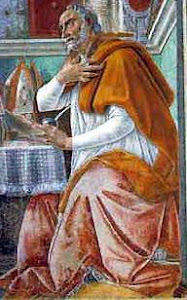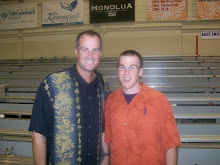
For those men out there who have been puzzled on the proper technique of a "man-hug" there is now a source that can clear away all of that confusion: Mechanics of the Man Hug.
This site also has a lot of interesting Manly Skills...

Resurrexi, et adhuc tecum sum. Alleluia! - I have risen, I am still with you. Alleluia! Dear brothers and sisters, Jesus, crucified and risen, repeats this joyful proclamation to us today: the Easter proclamation. Let us welcome it with deep wonder and gratitude!
Resurrexi et adhuc tecum sum – I have risen, I am still with you, for ever. These words, taken from an ancient version of Psalm 138 (v. 18b), were sung at the beginning of today’s Mass. In them, at the rising of the Easter sun, the Church recognizes the voice of Jesus himself who, on rising from death, turns to the Father filled with gladness and love, and exclaims: My Father, here I am! I have risen, I am still with you, and so I shall be for ever; your Spirit never abandoned me. In this way we can also come to a new understanding of other passages from the psalm: "If I climb the heavens, you are there; if I descend into the underworld, you are there … Even darkness is not dark for you, and the night is as clear as day; for you, darkness is like light" (Ps 138:8,12). It is true: in the solemn Easter vigil, darkness becomes light, night gives way to the day that knows no sunset. The death and resurrection of the Word of God incarnate is an event of invincible love, it is the victory of that Love which has delivered us from the slavery of sin and death. It has changed the course of history, giving to human life an indestructible and renewed meaning and value.
"I have risen and I am still with you, for ever." These words invite us to contemplate the risen Christ, letting his voice resound in our heart. With his redeeming sacrifice, Jesus of Nazareth has made us adopted children of God, so that we too can now take our place in the mysterious dialogue between him and the Father. We are reminded of what he once said to those who were listening: "All things have been delivered to me by my Father; and no one knows the Father except the Son and any one to whom the Son chooses to reveal him" (Mt 11:27). In this perspective, we note that the words addressed by the risen Jesus to the Father on this day – "I am still with you, for ever" – apply indirectly to us as well, "children of God and fellow heirs with Christ, provided we suffer with him in order that we may also be glorified with him" (cf. Rom 8:17). Through the death and resurrection of Christ, we too rise to new life today, and uniting our voice with his, we proclaim that we wish to remain for ever with God, our infinitely good and merciful Father.
In this way we enter the depths of the Paschal mystery. The astonishing event of the resurrection of Jesus is essentially an event of love: the Father’s love in handing over his Son for the salvation of the world; the Son’s love in abandoning himself to the Father’s will for us all; the Spirit’s love in raising Jesus from the dead in his transfigured body. And there is more: the Father’s love which "newly embraces" the Son, enfolding him in glory; the Son’s love returning to the Father in the power of the Spirit, robed in our transfigured humanity. From today’s solemnity, in which we relive the absolute, once-and-for-all experience of Jesus’s resurrection, we receive an appeal to be converted to Love; we receive an invitation to live by rejecting hatred and selfishness, and to follow with docility in the footsteps of the Lamb that was slain for our salvation, to imitate the Redeemer who is "gentle and lowly in heart", who is "rest for our souls" (cf. Mt 11:29).
Dear Christian brothers and sisters in every part of the world, dear men and women whose spirit is sincerely open to the truth, let no heart be closed to the omnipotence of this redeeming love! Jesus Christ died and rose for all; he is our hope – true hope for every human being. Today, just as he did with his disciples in Galilee before returning to the Father, the risen Jesus now sends us everywhere as witnesses of his hope, and he reassures us: I am with you always, all days, until the end of the world (cf. Mt 28:20). Fixing the gaze of our spirit on the glorious wounds of his transfigured body, we can understand the meaning and value of suffering, we can tend the many wounds that continue to disfigure humanity in our own day. In his glorious wounds we recognize the indestructible signs of the infinite mercy of the God of whom the prophet says: it is he who heals the wounds of broken hearts, who defends the weak and proclaims the freedom of slaves, who consoles all the afflicted and bestows upon them the oil of gladness instead of a mourning robe, a song of praise instead of a sorrowful heart (cf. Is 61:1,2,3). If with humble trust we draw near to him, we encounter in his gaze the response to the deepest longings of our heart: to know God and to establish with him a living relationship in an authentic communion of love, which can fill our lives, our interpersonal and social relations with that same love. For this reason, humanity needs Christ: in him, our hope, "we have been saved" (cf. Rom 8:24).
How often relations between individuals, between groups and between peoples are marked not by love but by selfishness, injustice, hatred and violence! These are the scourges of humanity, open and festering in every corner of the planet, although they are often ignored and sometimes deliberately concealed; wounds that torture the souls and bodies of countless of our brothers and sisters. They are waiting to be tended and healed by the glorious wounds of our Risen Lord (cf. 1 Pet 2:24-25) and by the solidarity of people who, following in his footsteps, perform deeds of charity in his name, make an active commitment to justice, and spread luminous signs of hope in areas bloodied by conflict and wherever the dignity of the human person continues to be scorned and trampled. It is hoped that these are precisely the places where gestures of moderation and forgiveness will increase!
Dear brothers and sisters! Let us allow the light that streams forth from this solemn day to enlighten us; let us open ourselves in sincere trust to the risen Christ, so that his victory over evil and death may also triumph in each one of us, in our families, in our cities and in our nations. Let it shine forth in every part of the world. In particular, how can we fail to remember certain African regions, such as Dafur and Somalia, the tormented Middle East, especially the Holy Land, Iraq, Lebanon, and finally Tibet, all of whom I encourage to seek solutions that will safeguard peace and the common good! Let us invoke the fullness of his Paschal gifts, through the intercession of Mary who, after sharing the sufferings of the passion and crucifixion of her innocent Son, also experienced the inexpressible joy of his resurrection. Sharing in the glory of Christ, may she be the one to protect us and guide us along the path of fraternal solidarity and peace. These are my Easter greetings, which I address to all who are present here, and to men and women of every nation and continent united with us through radio and television. Happy Easter!
 Sen. John McCain
Sen. John McCainDenver, Mar 10, 2008 / 07:25 pm (CNA).- As John McCain looks towards the open waters of the general election he is trying to consolidate his support amongst what he sees as a key demographic—Catholics.
Speaking to members of his National Catholics for McCain Committee this afternoon in a conference call, the senator addressed issues of concern to Catholics.
One Catholic supporter from South Carolina voiced his concern about the endorsement of Pastor John Hagee, an evangelical Christian who has made comments derogatory of Catholics both in his preaching and his writing. McCain responded by repeating his repudiation from this past Friday of any anti-Catholic comments made by Hagee.
David Adams from Florida speculated that perhaps the Catholic vote could be won by McCain on more centrist issues such as human rights and religious freedom. He asked the senator, “What will you do as president to promote human rights in places like Darfur or those persecuted for their religious beliefs in, say for example, Afghanistan…?”
Sen. McCain replied by saying that he believes that his “very clear record” on human rights, his statements and speeches on Darfur and his support for stopping the genocide that took place against Muslims in Bosnia are issues that Catholics can unite behind him on.
While McCain is pro-life on the issue of abortion, he differs with the Catholic belief that embryonic stem cell research is immoral. The Catholic Church teaches that embryonic stem cell research is immoral because it involves the killing of embryos.
Austin Ruse from Catholic Family and Human Rights Institute (C-FAM) raised the issue with the Arizona senator by asking him whether he had considered changing his position on embryonic stem cell research given the dramatic scientific advances of the last two months. McCain responded to Ruse’s question by saying that while he is “very encouraged” by the advances, he has yet to see “sufficient scientific evidence” to change his support for the practice. He added that he will continue to examine the issue and receive briefs on any progress being made.
The McCain campaign is actively recruiting Catholics around the country, including at the parish level, as the Republican nominee plans for his run against the still undetermined Democrat competitor.




